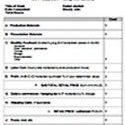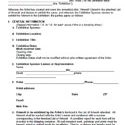Starting an Art Business
 Once you decide that you want to sell your art on a serious level, you should be aware that this decision creates certain legal requirements on the local, state local federal level. It may seem less trouble to avoid or ignore the requirements but failure to take them into consideration can cause many headaches down the road.
Once you decide that you want to sell your art on a serious level, you should be aware that this decision creates certain legal requirements on the local, state local federal level. It may seem less trouble to avoid or ignore the requirements but failure to take them into consideration can cause many headaches down the road.
Since each artists situation is different, it is important to do diligent research or consult with an attorney specializing in corporate law and an accountant who can also supply needed help. A valuable source of information is the Small Business Administration and its web site and the local Small Business Development center that has classes in many areas of business
First Steps
Business Plan
Form of Organization
Tax ID Numbers
Sales Tax ID
Business License
Business Plan
Although a business plan is not a required document, it is a wise first step to analyze the feasibility of creating a successful business. Outlined in the business plan are a description of the business and location, the products and services for sale, a market analysis, a marketing plan, and an analysis of the competition. An analysis of product pricing and expenses along with projected financial statements will also be included. This document may be informal but if used to secure credit or investors will usually be quite formal. There are numerous online sources to help in creating a business plan.
Forms of Organization
Sole Proprietorship
Partnership
Limited Liability Co
Corporation
- Sole Proprietorship
A sole proprietor is someone who owns an unincorporated business by him(her)self. This would be the most used form of organization by an artist. The sole proprietor files an individual tax return and is subject to self employment tax (Social Security and Medicare of15.3%). A sole proprietor can be held personally liable for any business related obligations. There is no distinction between business and personal assets. The sole proprietor can consist of husband and wife. This is the only form of organization that does not require an annual review and fee with the Secretary of State. - Partnership
A partnership exists when two or more persons who contribute money, property, labor or skill and expect to share in the profits and losses of the business. A partnership must file an annual information return but does not pay income tax. It ‘passes through’ any profits and losses to the partners who include the profit or loss on their individual income tax returns. - Limited Liability Company
A Limited Liability Company (LLC) is a relatively new business structure similar to a corporation. Owners have limited personal liability for the actions and debts of the LLC. Owners of an LLC ae call members. Members may include individuals, corporations, other LLCs and foreign entities. Other features of LLCs are more like a partnership or sole proprietorship, providing management flexibility and the benefits of pass through taxation. An LLC can consist of one member. - Corporation
A ‘C’ corporation is a complex business structure with more start up costs than the other forms. A corporation is a legal entity separate from it owners, who own shares of stock in the company. Profits are taxed both at the corporate level and again when distributed to shareholders.An ‘S’ corporation is similar to a ‘C’ corporation, but offers the avoidance of double taxation. If a corporation qualifies for ‘S’ status with the IRS, it is taxed like a partnership. The corporation is not taxed but income flow to shareholders who report the income on their individual tax returns.
Overview
The artist is already considered a sole proprietor if he/she is already selling their art. If the artist wishes to form an LLC, they should probably consult a lawyer or use a service such as bizfilings.com. If the artist chooses to file themselves he/she can apply for an LLC with the Secretary of State by filing the correct paperwork outlined on its web site. To create a corporation, the artist would definitely need a lawyer.
- Federal and State Tax IDs
If the artist is a sole proprietor, he/she may use their social security numbers.Any other form of organization must obtain a taxpayer identification number and register with the state. You can register and obtain both a federal tax id and a state id from the georgia.gov web site. The address is listed in the handout.If you are a corporation or LLC, you must reserve your company name when registering with the Secretary of State. - Business License
An artist working from his/her home will usually need to obtain a business license from the county or city. This will be a In Home/Occupation business license.If the artist is working from a location outside his/her home, the artist must obtain a Commercial business license.You are supposed to have the business license before making your first sale or you can be subject to penalty. You should check with your local agency for complete rules relating to business licenses since the rules vary by county or city.In addition to the business license you may have to register any trade name used if you do not include your name in the company name. - Sales Taxes
You will be able to be exempt from materials purchases and some vendors will not do business with you unless you have a tax number. You will need to file a quarterly return and remit taxes on any sales you make.
Accounting
Hobby?
Record Keeping
Spreadsheets
Accounting Software
Taxes
- Hobby?
Is my business a hobby? You cannot claim a loss on hobby income. - Sole Proprietor, LLC, Partnership, S Corp
You should show a profit in 3 of 5 years as a general rule but subject to IRS judgment. Do you run the business in a professional businesslike manner with an intent to show a profit? C corporations are assumed to be for profit entities by their nature and are not subject to the rule. - Record Keeping
In general you should keep a record of all income and expense in order to satisfy an IRS audit should one occur. The IRS likes computerized accounting records. It helps to show you are a not a hobby. - Income
– Sales
– Prizes, awards, fellowships, endowments
– Trades - Expenses
– Materials
– Travel and Meals
– Auto Expense and Mileage (58.5 cents)
– Equipment
– Depreciation vs Section 179
– Home Studio (Special rules apply) - Spreadsheets
The simplest way to keep your financial records is with a spreadsheet. You can create a spreadsheet that contains 12 tabs, one for each month and contains each expense or income category in columns. - Software
– Quicken & MS Money
– Quickbooks
– Peachtree
– Microsoft Office Acctg
– MYOB
Accounting Decisions
Cash or Accrual
Fiscal Year
Inventory
Chart of Accounts
- Cash or Accrual
– Cash – Income and expense are not counted until cash is received or expense is actually paid.
– Accrual – Income is recognized when sale occurs and expense is recognized when you receive goods or services. (Accounts Payable and Receivable) - Fiscal Year
– Calendar Fiscal Year – January through December
– Non Calendar Fiscal Year – July through June for instance
– Usually only corporations use a non calendar year (Seasonal business)
– Once established cannot be changed - Inventory
– Cash In – Cash Out
– Cost of Goods Sold CalculationExample:
Beginning Inventory: $5,000.00
Materials purchased this year: $3,000.00
Frames purchased this year: $6,000.00
Giclee printing this year: $2,000.00
Total inventory available for year: $16,000.00
Ending inventory: -$5,500.00
Cost of Goods Sold: $10,500.00 - Chart of Accounts
You should have an account set up to accurately record the most typical expenses and income. Here are several
examples of each.Income – These would be categorized however you wish to track sources of income. They could be Oil Painting Sales, Pastel Painting Sales, Frame Sales, etc.Expenses
– Studio Rent
– Art Supplies
– Telephone
– Auto Expense
– Subscriptions
– Printing
– Promotion & Advertising
– Utilities
– Memberships
– Entry Fees
– Postage
– InsuranceChart
– Tax & Legal
– Travel
– Meals & Entertainment
– Business Gifts
– Equipment
– Cultural Events
– Educational
– Commissions
In Conclusion
There is no one size fits all solution to being in business. There are many resources available to help you. Having an accountant review your individual situation and make recommendations would prove to be invaluable. Keep in mind that small businesses are more likely to be audited by the IRS than any other group. Keeping good records is essential in being able to defend yourself.



